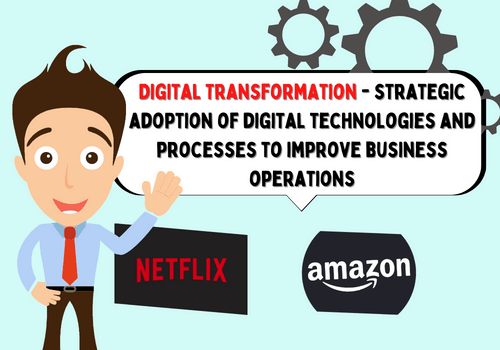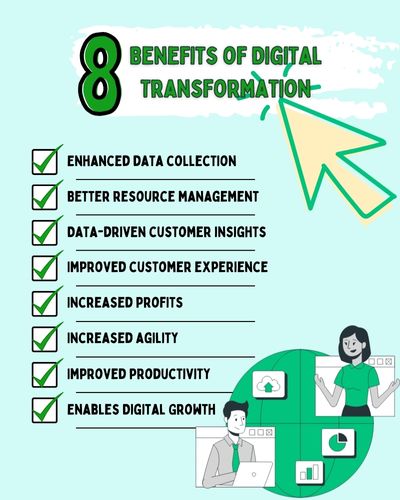The term ‘Digital Transformation’ has been making rounds in the business world for quite some time now. It refers to the integration of digital technology into all aspects of a business, resulting in fundamental changes in how businesses operate and how they deliver value to their customers.
In the coming years, trends in digital transformation 2022, like artificial intelligence and big data analytics, are expected to reach a tipping point and become mainstream in business operations.
Despite all the hype, many small to medium businesses (SMBs) are still hesitant to go down the digital transformation route. There are a lot of fears and myths surrounding digital transformation that stop SMBs from taking the plunge. In this article, we will attempt to address these fears and help you understand why you should not be afraid of digital transformation.
What is Digital Transformation in 2022?

Digital Transformation is a strategic adoption of digital technologies and processes to improve business operations. It has been an ongoing process for years, however, the last couple of years have seen an accelerated rate of digital transformation. Businesses across all industries have realized the need to go digital in order to stay competitive in their respective markets.
Examples such as Netflix and Amazon are two of the most successful companies that have implemented digital transformation. Netflix has a streaming video model and Amazon has closed down physical stores in favor of an online store. These are just two of the most obvious examples of digital transformation, but there are many more technologies driving the digital transformation process.
Technologies such as Artificial Intelligence (AI), cloud computing, mobile technologies, social media platforms, and next-generation technologies, such as the Internet of Things (IoT), edge computing and robotic process automation (RPA) have changed the way information is accessed, making digital transformation an imperative for companies.
The fear of being outflanked by competitors has forced companies to speed up their adoption of digital technologies, with some seeing a three to seven year acceleration in just months, according to Laura Laberge, McKinsey’s director of capabilities for digital strategy (CIO).
It is time to embrace the change and eliminate the fear of digital transformation. Companies that do so are the ones that will be successful and reap the rewards.
Why Does Digital Transformation Sound Complicated?
As a small and medium business enterprise, the concept of digital transformation may seem daunting and complex. It is understandable to worry about the potential disruption to your current processes, and the thought of employees being resistant to such changes.
However, businesses must understand that digital transformation is an essential step in ensuring their success, and staying ahead of their competition. Traditional technologies are no longer relevant and are quickly becoming obsolete, making digital transformation an absolute necessity.
Digital transformation offers many advantages for businesses, such as increased productivity and efficiency, improved customer experience, process automation, and cost savings. Digital applications can help your business boost its performance, remain competitive, and grow its customer base.
It is important to explore the benefits of digital transformation and see how it can help your business. With the right guidance and support, digital transformation can be a smooth and hassle-free process. It is essential to assess the current needs of your business and look at the various tools and solutions available to you. With the right planning, digital transformation can help your business reach the next level of success.
Benefits of Digital Transformation

- Enhanced data collection: Data from all departments is collected in digital forms and utilized for business intelligence.
- Better resource management: Digital transformation brings information and resources together through digital tools or applications. Getting a consolidated view of resources helps in driving process innovation and efficiencies.
- Data-driven customer insights: Data from social media is an example of unstructured data. Along with structured data, you can gain customer-centric insights that help adapt strategies to boost growth.
- Improved customer experience: Customers are used to an on-demand experience with low prices, multiple choices, and quick delivery. You can provide a better customer experience and gain market share.
- Increased profits: Companies undergoing digital transformation improved efficiency and profitability as per reports. 80% of organizations increased profits while 85% say they increased market share.
- Enables digital growth
- Increased agility: Agility brought about from digital transformation improves speed to market and faster adoption with Continuous Improvement (CI) strategies.
- Improved productivity: Using digital transformation streamlines processes, automates manual tasks and integrated data, resulting in improved productivity.
How is Digital Transformation different for Small and Medium Enterprises?
You do not have to think about changing everything in your organization. Usually, an initial high-level analysis is sufficient to identify improvement areas.
Traditional Enterprise Resource Planning (ERP) type software applications were monoliths and took a long time to implement and needed an in-house IT team for support.
Today’s digital tools, on the contrary, work on an easy pay-as-you-go subscription model. You only pay for what features you use.
Digital transformation tools are cloud-based and available in a Software-as-a-Service model. That means you can access applications through a browser or mobile app, and no need for expensive IT teams or infrastructure. Moreover, customization is easy with simple drag and drop configurations, and API integrations are not that heavy.
Data is available in digital formats, and you can get real-time information on the status of a project. Analytical reports give actionable insights so you can identify issues early and act on them.
Maybe you only need to start with improving the sales process by empowering your team with simple CRM tools, improving pipeline management, and gaining customer insights. Improve your revenues.
Take a piece-meal approach and gradually scale up to other areas.
Embracing Digital Change for Success
Embracing digital change is essential for long-term success in any business. Zoho One is a comprehensive CRM platform, bundled with a suite of over 40 applications tailored to manage your business operations. The applications cover everything from Sales, Marketing and Customer Service, to Finance, Collaboration, and Project Management.
If you’re feeling overwhelmed with the complexities of digital transformation, we can help you make the transition. We are a Zoho authorized partner, and our experts can provide you with guidance and advice on how to best leverage Zoho to maximize the success of your business.
Let’s connect to discuss how Zoho can help you achieve your business goals. Together, we can make sure your digital transformation is a success.




